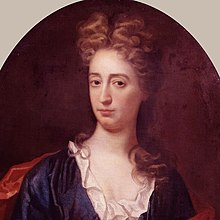
Anne was Queen of England, Scotland and Ireland from 8 March 1702 until 1 May 1707. On 1 May 1707, under the Acts of Union, the kingdoms of England and Scotland united as a single sovereign state known as Great Britain. Anne continued to reign as Queen of Great Britain and Ireland until her death in 1714.

General John Churchill, 1st Duke of Marlborough, 1st Prince of Mindelheim, 1st Count of Nellenburg, Prince of the Holy Roman Empire, was an English soldier and statesman. From a gentry family, he served first as a page at the court of the House of Stuart under James, Duke of York, through the 1670s and early 1680s, earning military and political advancement through his courage and diplomatic skill.

Sarah Churchill, Duchess of Marlborough, Princess of Mindelheim, Countess of Nellenburg, was an English courtier who rose to be one of the most influential women of her time through her close relationship with Anne, Queen of Great Britain. The Duchess of Marlborough's relationship and influence with Anne were widely known, and leading public figures often turned their attentions to her, hoping for favour from Anne. By the time Anne became queen, the Duchess's knowledge of government and intimacy with the Queen had made her a powerful friend and a dangerous enemy.
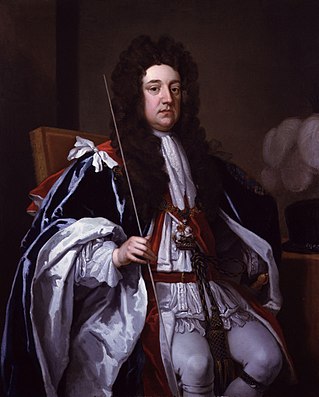
Sidney Godolphin, 1st Earl of Godolphin, was an English Tory politician and peer. He was a Privy Councillor and Secretary of State for the Northern Department before he attained real power as First Lord of the Treasury. He was instrumental in negotiating and passing the Acts of Union 1707 with Scotland, which created the Kingdom of Great Britain. He had many other roles, including that of Governor of Scilly.

Robert Harley, 1st Earl of Oxford and Earl Mortimer, KG PC FRS was an English statesman and peer of the late Stuart and early Georgian periods. He began his career as a Whig, before defecting to a new Tory ministry. He was raised to the peerage of Great Britain as an earl in 1711. Between 1711 and 1714 he served as Lord High Treasurer, effectively Queen Anne's chief minister. He has been called a prime minister, although it is generally accepted that the de facto first minister to be a prime minister was Robert Walpole in 1721.

Henrietta Godolphin, 2nd Duchess of Marlborough was the daughter of John Churchill, 1st Duke of Marlborough, general of the army, and Sarah Jennings, Duchess of Marlborough, close friend and business manager of Queen Anne.
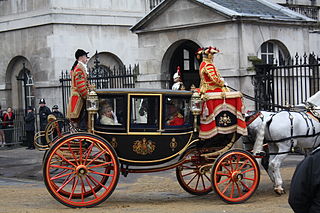
Lady of the Bedchamber is the title of a lady-in-waiting holding the official position of personal attendant on a British queen regnant or queen consort. The position is traditionally held by the wife of a peer. A lady of the bedchamber would give instructions to the women of the bedchamber on what their queen wished them to do, or may carry out those duties herself.
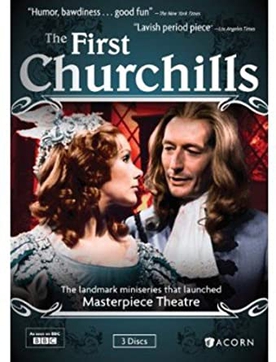
The First Churchills is a BBC serial from 1969 about the life of John Churchill, 1st Duke of Marlborough, and his wife, Sarah Churchill, Duchess of Marlborough. It stars John Neville as the duke and Susan Hampshire as the duchess, was written and produced by Donald Wilson, and was directed by David Giles. It is notable as being the first programme shown on PBS's long-running Masterpiece series in the United States. Wilson and Giles were fresh from their success in writing and directing The Forsyte Saga, which also starred Susan Hampshire and Margaret Tyzack.

Francis Godolphin, 2nd Earl of Godolphin,, styled Viscount Rialton from 1706 to 1712, was an English courtier and politician who sat in the English and British House of Commons between 1695 and 1712, when he succeeded to the peerage as Earl of Godolphin. Initially a Tory, he modified his views when his father headed the Administration in 1702 and was eventually a Whig. He was a philanthropist and one of the founding governors of the Foundling Hospital in 1739.
Brigadier-General Samuel Masham, 1st Baron Masham, was a British courtier in the court of Queen Anne, and the husband of her favourite, Abigail, Lady Masham.
Major-General John "Jack" Hill was a British army officer and courtier during the reign of Queen Anne. While of no particular military ability, his family connections brought him promotion and office until the end of Anne's reign.

Sir John Jennings KB of Halywell House, St Albans, was an English aristocrat and politician who sat in the House of Commons at various times between 1628 and 1642. He is now chiefly remembered as the grandfather of Sarah Churchill, Duchess of Marlborough, and of her nemesis Abigail Masham. He is also notable for the extraordinary number of children (22) whom he fathered, all from one marriage.
Sir Richard Jennings MP, was an English nobleman and politician who sat in the House of Commons at various times between 1642 and 1668. He took the Parliamentary side in the Civil War. He was the father of Sarah Churchill, Duchess of Marlborough, who was the confidante of Queen Anne.
St. James's is a novel by William Harrison Ainsworth serially published in 1844. It describes the events surrounding the end of Queen Anne's reign and the dispute between the Duke and Duchess of Marlborough with two Tories for influence over the queen.
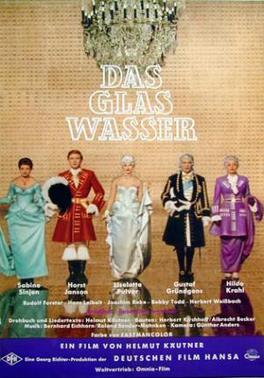
A Glass of Water is a 1960 West German comedy-musical film directed by Helmut Käutner and starring Gustaf Gründgens, Liselotte Pulver and Sabine Sinjen. It was entered into the 10th Berlin International Film Festival. It is an adaptation of the 1842 French play Le Verre d'eau by Eugène Scribe and is set in London in 1710 during the War of the Spanish Succession. It was shot at the Wandsbek Studios in Hamburg. The film's sets were designed by the art director Albrecht Becker and Herbert Kirchhoff.

Elizabeth Seymour, Duchess of Somerset and suo jureBaroness Percy was an English courtier.

John Churchill, Marquess of Blandford was a British nobleman. He was the heir apparent to the Dukedom of Marlborough – as the only surviving son of John Churchill, 1st Duke of Marlborough, an accomplished general, and Sarah Churchill, Duchess of Marlborough, a close friend of Queen Anne. Blandford died childless in 1703, and upon his father's death in 1722, the dukedom passed to his eldest sister, Lady Henrietta Godolphin.
Queen Anne is a 2015 play by the British playwright Helen Edmundson on the life of Anne, Queen of Great Britain. It is set between just before her accession in 1702 and her husband George's death in 1708 and centres on the relationship between Anne and her close friend Sarah, Duchess of Marlborough, by whom Anne was heavily influenced in the period before and during her reign.
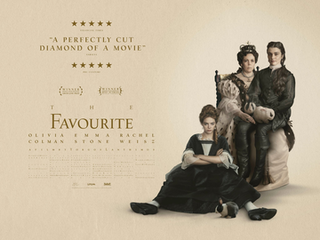
The Favourite is a 2018 period black comedy film co-produced and directed by Yorgos Lanthimos, from a screenplay by Deborah Davis and Tony McNamara. Set in early 18th-century Great Britain, the film's plot examines the relationship between cousins Sarah Churchill, Duchess of Marlborough, and Abigail Masham as they vie to be court favourite of Queen Anne. Principal photography for the British-Irish-American production lasted from March to May 2017 and took place at Hatfield House in Hertfordshire and at Hampton Court Palace.
A Glass of Water is a 1979 Soviet historical melodramatic comedy television film directed by Yuli Karasik and based on the 1840 play of the same title by Eugène Scribe, set in the court of Queen Anne of Great Britain at the start of the 18th century. The play was previously adapted for film in Russia in 1957.
